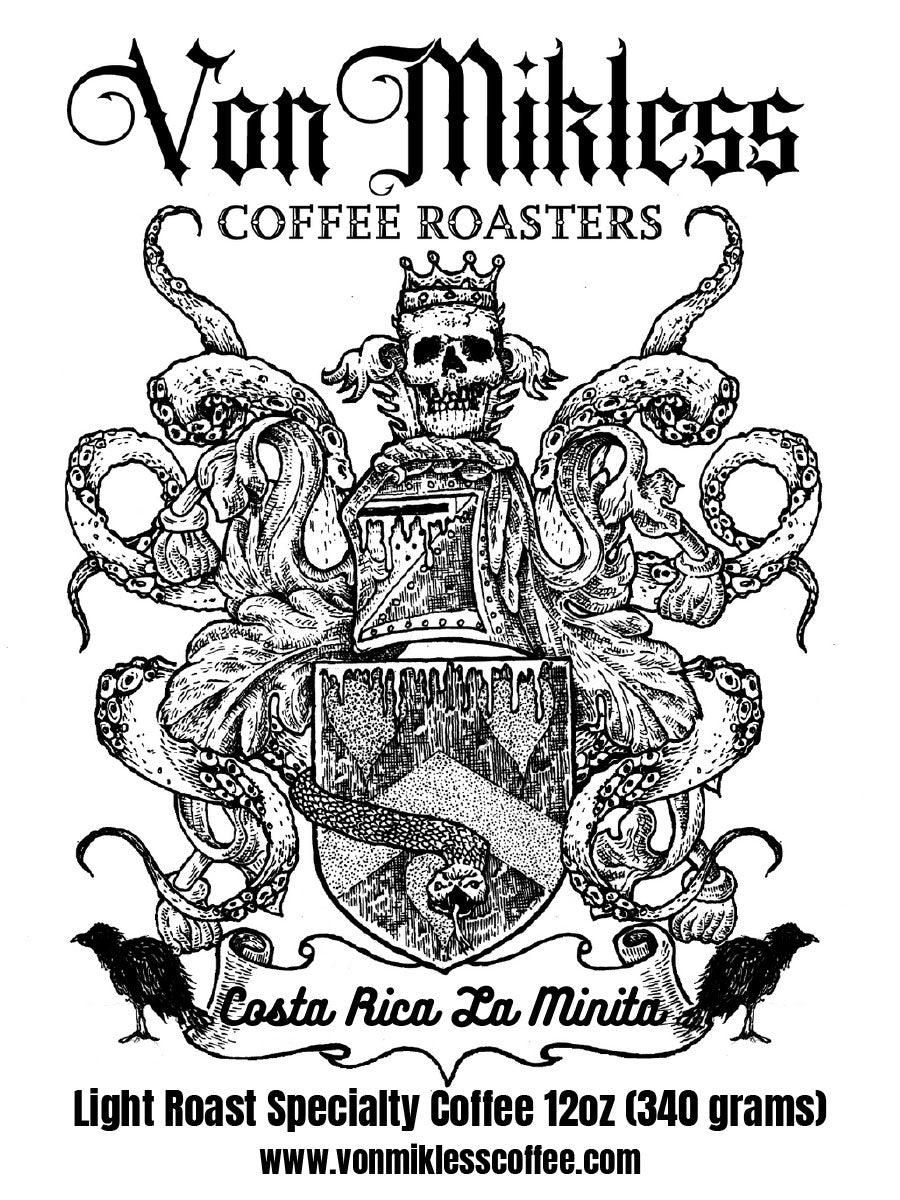Von Mikless Coffee Roasters
Costa Rica Tarrazu La Minita Light Roast Coffee Beans
Costa Rica Tarrazu La Minita Light Roast Coffee Beans
Couldn't load pickup availability
Statistics
Region: Tarrazu Region, Costa Rica
Estate: La Minita
Process: Washed
Varietals: Caturra, Typica
Altitude: 5000 ft
Certifications: Rain Forrest Alliance
Tasting Notes: Cocoa, Floral, Caramel, Citrus, Grain, Maple Sweetness, Crisp Clarity, Smooth
Costa Rica Tarrazu La Minita
Reputed as one of the best coffees in the world, it scores as high as 95 at cuppings, beating out most Jamaican Blue Mountain and Konas and tasting more like an Island coffee than a Costa Rican. The farm boasts meticulously grown coffee, paying attention to every detail, and turning the profits into educating, caring for, and improving the lives of those living nearby. Only about 1,000 burlap bags a year are sold, and the beans branded as "La Minita" are only the top 18% of their total crop. Costa Rica La Minita is a light roast where you find subtle maple sweetness, slight sweet citrus, milk chocolate, slight floral notes, crisp clarity, and wonderful smoothness. It’s a coffee that you can brew and have sit there for an hour, and still not be bitter or astringent after it cooled down. The beans really are that perfect. If you’ve not heard or tried La Minita before, you really need to give it a try. The farm is officially Rainforest Alliance Certification. They did not have to make the slightest change to their farm to receive certification — they were already exceeding all the guidelines for wildlife habitat, soil erosion, shade trees, conservationism, water use, etc. The amazing things the farm does for its workers and the community are limitless. Educations, social programs, medical assistance. The workers are PASSIONATE about the coffee, knowing they are growing some of the best coffee anywhere in the world.
Shipping: The price of shipping one bag of coffee is the same for 2 bags of coffee.
FREE Local Delivery is available with a minimum purchase of two bags of roasted coffee to the following Oregon cities: Mount Angel, Silverton, Scotts Mills, Woodburn, Canby, Hubbard, Sublimity, Stayton, Aumsville, Keizer, and Salem.
Rain Forest Alliance (https://www.rainforest-alliance.org)
Below, we summarize the impact of the Rainforest Alliance Certification, focusing on the 3Ps – people, planet, profit.
The 3Ps provide a great framework for talking about sustainability. Why? Because they demonstrate the importance of taking a holistic approach, balancing social, environmental and economic considerations. Partner companies can use the 3Ps to explain why they have chosen to work with the Rainforest Alliance and to show employees and customers what it means in terms of concrete benefits for farmers, workers, their families and the planet.
People
The rights and well-being of people are key to the Rainforest Alliance Sustainable Agriculture Standard on which certification is based. Human rights must be respected on Rainforest Alliance Certified farms, to make them better and safer places on which to live and work. Farmers are required to provide decent housing for workers, and access to clean drinking water, sanitation and healthcare. On a certified farm, workers must wear the right protective clothing when working with chemicals. The Rainforest Alliance addresses child and forced labor and promotes gender equality and non-discrimination. Certified farms work towards better livelihoods for farmers and workers.
Planet
Farmers in the Rainforest Alliance certification program use land, water and energy carefully, protecting natural resources and the environment in which they live and work. They help to protect the planet by using fewer artificial fertilizers and pesticides, preventing pollution and carefully managing waste. Farmers learn to protect forested and protected areas, which in turn helps support biodiversity of plants and animals. They are trained to use climate-smart farming techniques which helps them adapt and become more resilient to the effects of a changing climate.
Profit
The Rainforest Alliance farming methods result in better quality crops and higher yields–with lower costs–helping create long-term increased productivity and improved incomes. Farmers can also negotiate a better price for their products. Better prices with lower costs mean higher profits; and higher profits contribute to a better quality of life and more opportunity to invest for the long term. That’s good for farmers, their families and their communities.
Share


